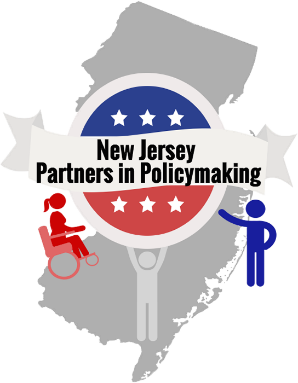Purpose

New Jersey Partners in Policymaking is a leadership development and advocacy education program for adults with developmental disabilities (over age 21) and family members of children and transition age youth coordinated through a collaboration of New Jersey’s Developmental Disabilities Act Network Partners— The Boggs Center on Disability and Human Development, The New Jersey Council on Developmental Disabilities (NJCDD), and Disability Rights New Jersey—and funded by NJCDD. The goal of this program is to prepare the next generation of disability advocates to work toward meaningful change in our state.
Through participation in in-person and virtual educational leadership development sessions and completion of online assignments, selected participants learn about best practices and important areas for advocacy from nationally-known experts. Upon completion of the program, participants will have developed the knowledge and skills needed to:
- Advocate for opportunities and supports that promote self-determination, independence, and inclusion in all aspects of community life
- Be members of advisory boards and committees
- Work alongside policymakers and state agencies
Requirements of Participation
Participation in all educational leadership development sessions held in New Brunswick, NJ and virtually.
- In-person sessions will be held one weekend a month in September, October, December, March, and May (Friday 2:00 pm – 8:00 pm and Saturday 8:30 am – 3:00 pm)
- Virtual sessions will be held one weekend a month in November, January, and February (Friday 2:00 pm – 6:00 pm and Saturday 9:00 am –1:00 pm) and one Wednesday a month from 6:00 pm – 8:00 pm from October through April.
Completion of between-session online assignments. These assignments will be given to enhance learning between online sessions and may include watching videos and other assignments.
Completion of homework assignments, including the development of an Advocacy Action Plan
Why Partners?
Why Partners? Check out our video to learn more about the program and hear from graduates about their experiences.
Apply to the Partners in Policymaking Program
The application period for the 2025-2026 class has ended. We expect the next application period to open in Spring 2026.
This work is supported by the New Jersey Council on Developmental Disabilities, in part by grant number 2301NJSCDD, from the U.S. Administration for Community Living (ACL), Department of Health and Human Services (HHS), Washington, D.C. 20201 as part of a financial assistance award totaling $2,168,166.00 with 85% funded by ACL/HHS and 15% funded by the State of NJ. Grantees undertaking projects with government sponsorship are encouraged to express freely their findings and conclusions. Points of view or opinions do not, therefore, necessarily represent official ACL policy and do not necessarily represent the official views of, nor an endorsement, by ACL/HHS, or the U.S. Government.

